55 Ethnic Minorities in China
Each of the minority ethnic groups has a distinctive and different character. The following are the 55 ethnic minorities listed in the alphabetical order:
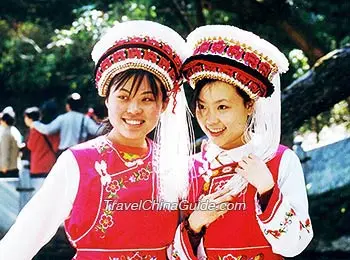 |
| Young Girls of Bai Nationality |
Bai: the masters of artistic creativity and favor white clothes and decorations; creative in architecture, painting, music, sculpture and lacquer work
Blang: live in Yunnan Province; mainly practice agriculture; good at planting tea trees and early rice; do many artistic practices such as literature and music
Bonan: live in southwest of Gansu Province; mainly engage in handicraft industry; believe in Islam; play traditional woodwind or stringed instrument
Bouyei: inhabit in Guizhou Province as early as in the Stone Age; advanced in agriculture and forestry; good at brocade and embroidery
Chaoxian: dwell mainly in northeastern part of China; their ancestors are the immigrants from the Korean Peninsula; have similar festivals with Han People
Dai: distribute in southern part of Yunnan Province; a versatile nation who has made certain achievement in music; believe in Southern Buddhism
Daur: a considerably smaller minority who said to be the descendants of Khitan tribe in Liao Dynasty; lay stress upon etiquette; have many taboos of their own
Deang: a small minority distributed in Yunnan Province; they are skilled craftsman, and have profound tea culture; rice, wheat, corn and legume are the staple foods
Dong: living in the border regions between Hunan, Hubei and Guizhou Provinces; skilled in handcrafts; rice, millet, wheat sorghum are the staple foods
Dongxiang: mainly inhabit in Gansu Province, with farming and stocking as their mode of production; believe in Islam; enjoy drinking tea
Dulong: one of the smallest minority groups in China; believing that there are spirits who control everything; have two meals a day; carpet is their distinctive handicraft
Ewenki: mostly live in the Inner Mongolia Autonomous Region; good at singing and dancing, horse-racing and wrestling; believe that Gods control their life
Gaoshan: most live on Taiwan Island; like singing ballads and telling tales; have rituals for daily activities, such as sowing, harvesting, hunting and fishing
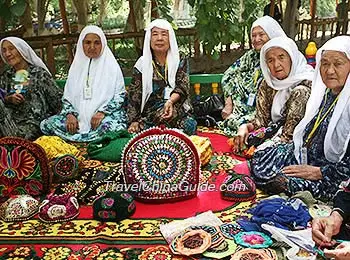 |
| Hui Nationality in Xinjiang |
Gelao: an old ethnic minority good at the refinement of forging, blacksmith and stonecutting; believe in the bless from many Gods and their ancestors
Gin: most live in Guangxi Zhuang Autonomous Region; make a living on farming and fishing; most believe in Taoism; seafood and rice are their staple foods
Hani: mainly inhabit within the reaches of Yuan and Lantsang Rivers; have interesting marriage custom; believe in the great influence of many Gods and their ancestors
Hezhen: the smallest minority in China; believe in Shamanism and all have spirits and worship as many gods; fish is their staple food
Hui: believe in Islamism; the religious thoughts play important role in their daily life; their life style is very different from other minority groups
Jingpo: mainly distribute in Yunnan Province; skilled at carving, painting, weaving and embroidering; believe everything has a soul which will never die
Jino:live mainly in Yunnan Province; an old minority who believe in animism; rice and corn are their staple food; the Iron Forging Festival is the grandest festival
Kazak: mainly dwell in Xinjiang, Gansu and Qinghai; love music and have many unique musical instruments such as Dongbula; believe in Islam
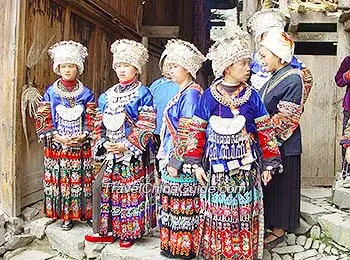 |
| Miao Ethnic Minority in Guizhou |
Kirgiz: most live in Xinjiang; adept at literature, music, sports and handicrafts; do animal husbandry; some of them believe in Islam and some believe in Tibetan Buddhism
Lahu: most are scattered around the Lancangjiang Lahu Autonomous County; believe in Mahayana; regard black as the most beautiful color
Li:mainly live in middle and southern part of Hainan Province; favorite corn, rice and sweet potatoes; depend on agriculture, breeding and handicrafts industries
Lisu:most live in Yunnan and Sichuan Provinces; mainly live on corn and buckwheat; created their own calendar composed of ten months divided by nature's change
Luoba:dwell at the foot of Himalayas, and make a living by doing agriculture and hunting; have unique food custom, and corn, rice and a kind of local grain are their staple foods
Man:originated from the Jurchen tribes; have a long history and brilliant culture; the creator of Jin and Qing Dynasties; has made great influence to Chinese history
Maonan:mainly distribute in Huanjiang County in Guangxi Province; live on agriculture and handicraft industry; rice and corn are their staple foods
Miao:has a relatively larger popular compared with other minorities in China; skillful in handicrafts such as paper-cutting, embroidery, weaving, and jewelry casting
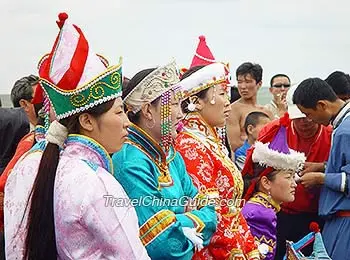 |
| Mongolians in Inner Mongolia |
Monba: mainly distribute in Tibet and has a long history; their staple food are corn, rice and buckwheat; adept in weaving with vines and bamboo vines; have interesting wedding ceremony
Mongol:primarily live in Inner Mongolia; the minority on the horseback; the staple food is meat and milk; the greatest festival is Nadam Fair
Mulam:a smaller minority group dwelling mainly in Guangxi Province; believe in natural spirits; adept at pottery making and iron forging
Naxi: mainly live in Yunnan, Sichuan and Tibet; the major production activities are handicrafts, stock breeding and farming; most of them believe in Dongba Religion
Nu: most live in the southwest of Yunnan Province; believe everything has spirit and some believe in Christianity and Lamaism; good at playing musical instruments
Oroqen:dwell mainly in Inner Mongolia and Heilongjiang Province; good at hunting and making wares with iron, wood and bone; the staple food is meat
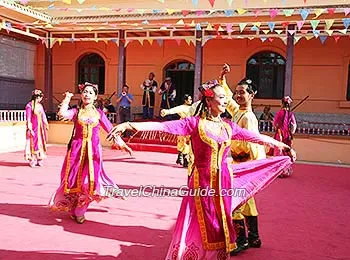 |
| Dance of Uygur Minority |
Qiang: mainly live in Aba Tibetan Autonomous Prefecture in Sichuan Province; their staple foods are beef, mutton, chicken, fish, corn, wheat and potatoes
Russ: derived from Russian immigrates in 18th Century; most live in Xinjiang Uygur Autonomous Region; celebrate Christmas Day and Easter Day
Salar:mainly live in Qinghai, Gansu and Xinjiang Provinces; make a living by engaging in horticulture, handicrafts and agriculture
She: most live in Fujian and Zhejiang Provinces; believe in the influence of ancestors and totems; the staple foods are corn, rice, beans and potatoes
Shui: mainly distribute in Guizhou Province; have their own language; good at stone-carving, paper-cuts, silver jewelry making and batik techniques
Tagik: have splendid culture and long history; live on agriculture and stock husbandry; believe in Islam and lay stress upon etiquette
Tatar: mainly live in Xinjiang Uygur Autonomous Region; have their own language; follow Islam; depend on agriculture, stock husbandry and handicrafts
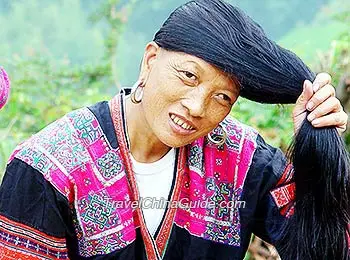 |
| Long Hair Yao Minority, Guangxi |
Tu: mainly distribute in Qinghai and Gansu Provinces; practice Animism and Taoism; live on agriculture, stock husbandry and sheep breeding
Tujia: distribute widely in Hunan, Hubei, Guizhou and Sichuan Provinces; believe in the great influence of gods and ancestors; live on agriculture and fish industry
Uygur: mainly live in Xinjiang Uygur Autonomous Regions; believe in Islam; their unique staple foods are nang, zhuafan and noodles
Uzbek:mainly live in Xinjiang Uygur Autonomous Regions; believe in Islam, and depend on stock breeding and handicrafts industries
Wa:mainly live in Yunnan Province; make a living by doing agriculture; some believe in Buddhism and Christianity; rice is their staple food
Xibe: distribute in Jilin, Liaoning and Xinjiang Uygur Autonomous Region; live on stock husbandry and agriculture; wheat flour, rice and mutton are their staple food
Yao:distribute widely in the mountainous areas in south of China; corn, rice and potatoes are their staple food and they like drinking tea and homemade wines
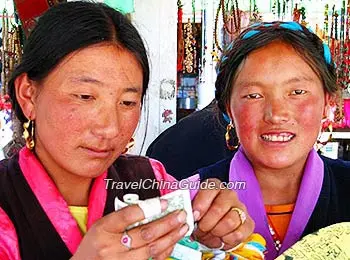 |
| Tibetan Women in Tibet |
Yi: widely live in Yunnan, Guizhou, Sichuan and Guangxi Provinces; have a long history and splendid culture; treasure various beliefs
Yugur:mainly live in Gansu Province; the typical nomads live on stock breeding; believe in Lamaism; preserve many traditional cultures such as folk tales, legends and ballads
Zang:most live in the Tibetan Autonomous Region; believe in Tibetan Buddhism (also called Lamaism); Tsamba, butter tea, mutton and beef are their staple foods
Zhuang:the largest minority group in China mainly living in Guangxi Zhuang Autonomous Region; has a long history and splendid culture
- Last updated on Aug. 07, 2025 by Gabby Li -